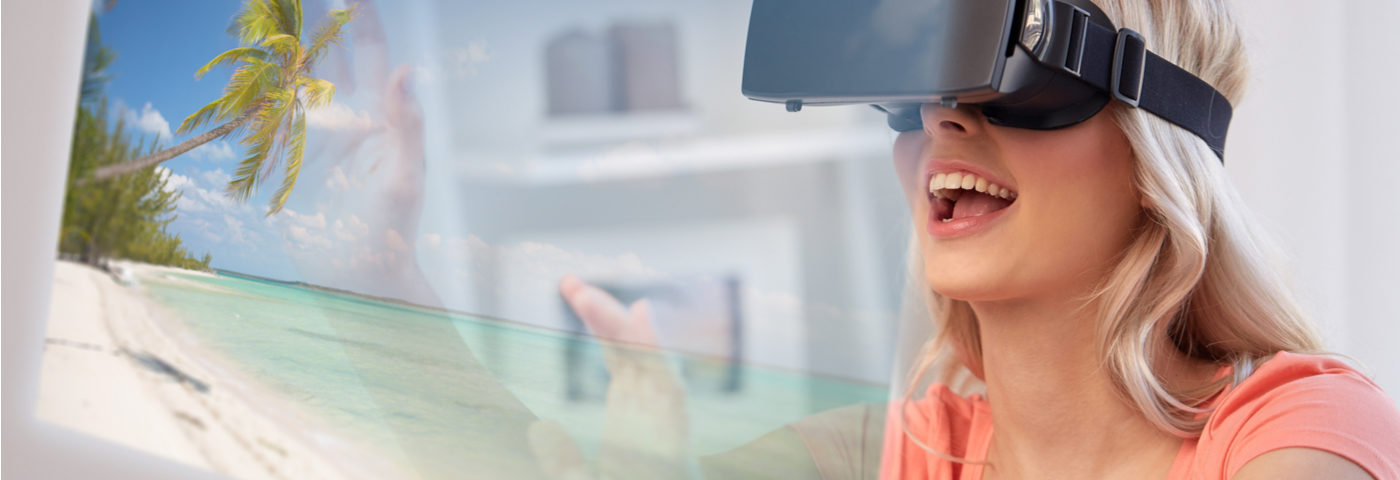The enthusiasm for virtual reality is growing as airlines consider all options for winning business and converting customers in the new post-Covid-19 world.
XR – extended reality – is the latest acronym doing the rounds. It is becoming the umbrella term to describe the virtual and augmented reality industries.
Virtual reality (VR) immerses users into a 3D computer-generated world, viewed through a headset – think gaming headsets and Oculus Rift. Augmented reality (AR) superimposes computer-generated images onto a person’s view of the real world – think Pokémon Go.
As travel resets and prepares for the post COVID-19 world, XR will be a useful tool for airlines looking to differentiate the experience they can offer to travellers.
VR has been part of the travel industry’s consumer-facing technology toolkit for some time. One obvious use case – customers walking into a high street travel agent and experiencing the resort via a VR headset – has been around since 2017, if not before. Lufthansa was an early airline adopter, using VR headsets to support upselling upgrades at the gate by showing passengers what business and first-class upgrades look like.
Since then, hardware, software and bandwidth issues stymied mass market take-up, as is often the case with emerging technologies. But these headwinds are starting to weaken as we welcome in the 2020s: headsets are getting smaller; 3G has been replaced with 4G; 5G is on the horizon bringing the promise of wireless VR; professional standard, VR-compatible content is now cheaper and easier to produce.
Enterprise technology analysts IDC expect mainstream adoption over the next few years. Its latest tracker says more than seven million VR/AR headsets will be shipped this year, a 23% hike in 2019 despite CV19. By 2024 that number will jump to 76.7 million, a compound annual growth rate for the five years of 81.5%.
And this impressive growth rate could be even higher if Apple gets its act together. Most of the major enterprise tech giants have skin in the XR game – Facebook, Samsung, Alphabet et al. Apple is the current exception, although there have been persistent rumours in the technology press that it is working on a combined VR and AR wireless headset. The company itself has been silent on this. A much anticipated launch in 2019 never happened and the latest unconfirmed date for launch is 2022.
Apple’s iPhone was a ground-breaking innovation which pre-empted the rise of the smartphone. Could its VR headset do the same for XR?
Some of the latest VR and AR initiatives from airlines and their airport partners indicate where the future might lead us. SunExpress, a Turkey-based charter carrier, has signed a deal with Lego to offer an in-flight branded Lego VR experience. The partnership gives SunExpress passengers a differentiated in-flight experience and helps Lego to reinforce its transformation into a digitally enabled entertainment and education business.
Gatwick Airport in the UK is one of the many airports around the world which has launched and is working to improve an AR-enabled app. The apps helps passengers navigate the airport while also giving them flight departure information and personalised offers.
The consumer-facing applications of VR and AR are the most exciting, but behind the scenes, there are many examples of airlines and airports using VR and AR to train staff, improve operations and optimise maintenance time. IATA has a dedicated working group specifically looking at enterprise uses for VR and AR within the industry.
In the short term, airlines and airports are waiting for the skies to re-open fully and for governments to restart the business of travel. Until then, airlines could use this downtime to look again at VR and AR because mainstream consumer interest in the tech continues to grow. And with Apple poised to enter the market, the current mainstream momentum will only increase.
You may also be interested in…
- Hydrogen will power the next generation of planes
- Airlines in Crisis: The Prognosis For The Aftermath of COVID-19
- What will air travel look like in the next six months?



thanks for the education